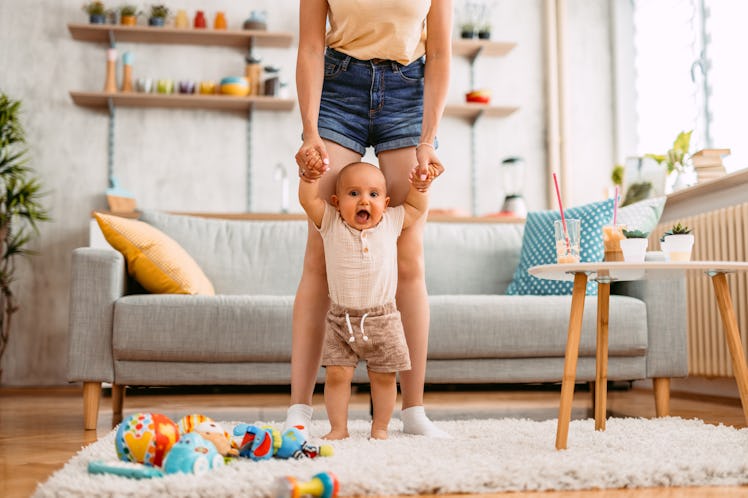When Do Babies Start Walking? When They’ve Gotten Plenty Of Practice
Toward the end of their first year, most babies will be looking to start their toddling career.

Whether you’re excited for your kid to go mobile or you’re worried about keeping up with their desire to explore, at some point most parents ask themselves “when do babies start walking?” But answering that question requires an understanding of how developmental milestones build on each other and fit together.
“The important point to keep in mind with developmental milestones is that there are ranges for each and every one. So just because your child doesn’t reach a certain one at the age we typically expect them, it isn’t immediately a cause for concern,” explains Tiffany Fischmann, M.D., a pediatrician and neonatologist. “We always look at the whole child and if they are meeting all of their other milestones. But if they haven’t reached one particular one yet, we tend to observe and give it a little time.”
When Do Babies Start Walking?
By 15 months, most neurotypical babies have moved from cruising to walking without needing to grab whatever is closest for support. But walking isn’t so much a skill as it is a collection of skills utilized together. A handful of milestones need to be reached first as babies build the strength and coordination necessary for them to start walking.
The order and speed that babies hit these milestones vary, even though parents can find an expected (though not guaranteed) progression of gross motor skill milestones to help gauge how their baby is doing. Here’s what parents can be on the lookout for as their baby develops:
- Most babies will start pushing up by 2 to 3 months.
- Expect some rolling (front to back or back to front) from your baby by 4 to 6 months.
- By 4 months, your baby should be sitting with support.
- Pulling up should begin around 9 months of age.
- Eventually most babies will start walking by 12 to 15 months.
Many babies progress in this order, but others hit these milestones concurrently, out of order, or not at all. Many babies skip milestones like crawling altogether, going straight from wiggling to standing to walking. And some babies progress at a certain pace for a while, then suddenly speed up or stall for a bit. The average age babies start to walk is an estimate, not an ultimatum.
Sign up for the Fatherly newsletter to get expert advice about fitness, gear, travel, style, parenting, and more in your inbox.
How to Help a Baby Learn to Walk
Parents may want to help their child develop these gross motor skills — they certainly take pride in their child learning to walk, even as it spells the end of a certain kind of easy, snuggle-based parenting. But according to Fischmann, the biggest thing parents can do to help their baby walk is supervise (and baby proof) for the sake of safety.
“There isn’t much you have to do as a parent to get your child to walk, but I think the best way to see them progress is to allow them to explore their environment,” says Fischmann. “Make sure your home is properly childproofed and relatively clean, and let your baby play on the floor and explore moving. Let them try to do things, let them fall, and let them explore outdoors as well. Obviously, always with close supervision.”
Will a Baby Walker Help My Baby Learn to Walk?
Parents can create situations where babies are more likely to discover their own abilities, but the work is up to the kid. Certain products that claim to help children walk, such as baby walkers, are not only completely useless but also downright dangerous.
“Bottom line: [Baby walkers] do not aid in the development of walking,” cautions Fischmann. “They put babies at risk for serious injuries, most from head injuries or falls downstairs. They allow babies who normally wouldn’t be able to get around to get into things they shouldn’t be getting into. Stationary play centers in moderation are a far better and safer alternative.”
Parents who want to help their babies start walking and become better walkers do have some options, though: Put away the cute baby shoes.
“Toddlers really need to feel the ground under their feet as they learn to walk and they do this best without shoes. They should also get used to different textures under their feet to help them develop their proprioception,” explains Fischmann. “Of course, there are times when toddlers will need to wear shoes, so you should choose something with a flexible sole and space for their feet to grow.”
Although it’s hard for new parents to avoid drawing comparisons between their baby and their friends’ babies, many conclusions they draw from those comparisons will be premature. Other times, missing milestones like a baby walking should be concerning, particularly after multiple delays, regressions, or failure to progress. Ultimately, parents should take baby walking milestones with a grain of salt and voice any concerns to their pediatricians.
This article was originally published on